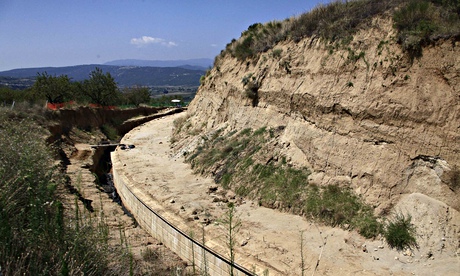Un article tiré du site en ligne du quotidien britannique "The Guardian" consacré à la découverte de la plus vaste tombe ancienne de la Grèce antique, tombe trouvée en Macédoine et datée de la période d'Alexandre le Grand

Archaeologists uncover Greece's biggest ancient tomb
Site dates to end of Alexander the Great's reign in 4th century BC and may be grave of a prominent Macedonian, say officials

The site where
archaeologists are excavating a ancient tomb in Amphipolis, northern
Greece. Photograph: Alexandros Michailidis/AP
Archaeologists have unearthed a vast ancient tomb in Greece,
distinguished by two sphinxes and frescoed walls and dating to
300-325BC, the government announced on Tuesday.
The tomb, in the country's north-eastern Macedonia region, which has been gradually unearthed over the past two years, marks a significant discovery from the early Hellenistic era. A culture ministry official said that there was no evidence yet to suggest a link to Alexander the Great – who died in 323BC after an unprecedented military campaign through the Middle East, Asia and northeast Africa – or his family.
The official said the Amphipolis site, about 65 miles north-east of Greece's second-biggest city, Thessaloniki, appeared to be the largest ancient tomb to have been discovered in Greece.
Archaeologists began excavating the site in 2012 and expect to enter the tomb by the end of the month to determine who was buried there.
"It looks like the tomb of a prominent Macedonian of that era," said a second culture ministry official. Alexander the Great died in Babylonia, in modern Iraq, and his actual burial place is not known.
Archaeologists have found two sphinxes, thought to have guarded the tomb's entrance, and a 4.5-metre-wide road leading into it, with walls on both sides covered by frescoes. It is circled by a 497-metre marble outer wall.
Experts believe a five-metre-tall lion sculpture previously discovered nearby once stood atop the tomb.
"It is certain that we stand before an especially significant finding. The land of Macedonia continues to move and surprise us, revealing its unique treasures," the prime minister, Antonis Samaras, said on Tuesday during a visit to the site.
The tomb, in the country's north-eastern Macedonia region, which has been gradually unearthed over the past two years, marks a significant discovery from the early Hellenistic era. A culture ministry official said that there was no evidence yet to suggest a link to Alexander the Great – who died in 323BC after an unprecedented military campaign through the Middle East, Asia and northeast Africa – or his family.
The official said the Amphipolis site, about 65 miles north-east of Greece's second-biggest city, Thessaloniki, appeared to be the largest ancient tomb to have been discovered in Greece.
Archaeologists began excavating the site in 2012 and expect to enter the tomb by the end of the month to determine who was buried there.
"It looks like the tomb of a prominent Macedonian of that era," said a second culture ministry official. Alexander the Great died in Babylonia, in modern Iraq, and his actual burial place is not known.
Archaeologists have found two sphinxes, thought to have guarded the tomb's entrance, and a 4.5-metre-wide road leading into it, with walls on both sides covered by frescoes. It is circled by a 497-metre marble outer wall.
Experts believe a five-metre-tall lion sculpture previously discovered nearby once stood atop the tomb.
"It is certain that we stand before an especially significant finding. The land of Macedonia continues to move and surprise us, revealing its unique treasures," the prime minister, Antonis Samaras, said on Tuesday during a visit to the site.
Aucun commentaire:
Enregistrer un commentaire